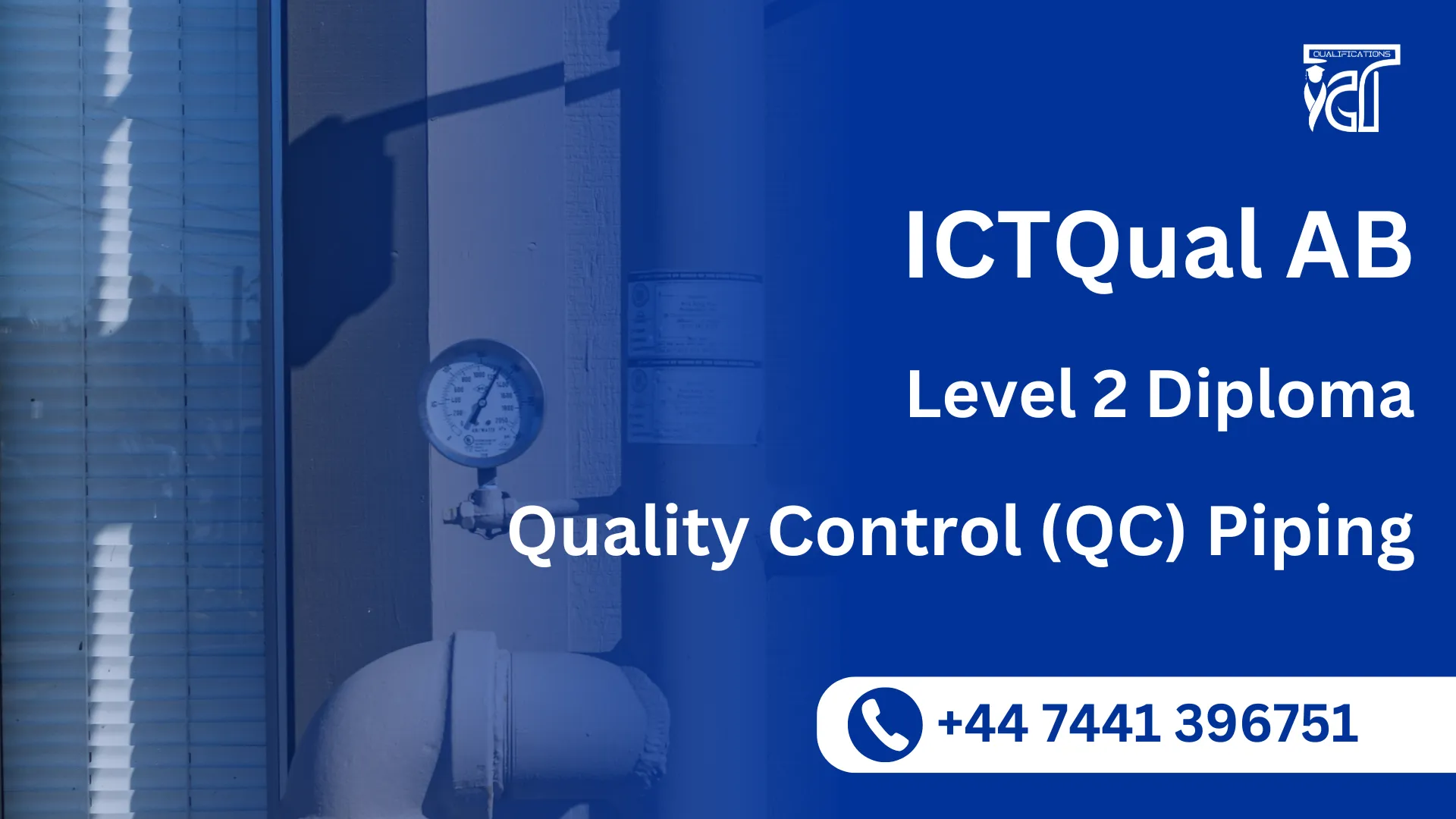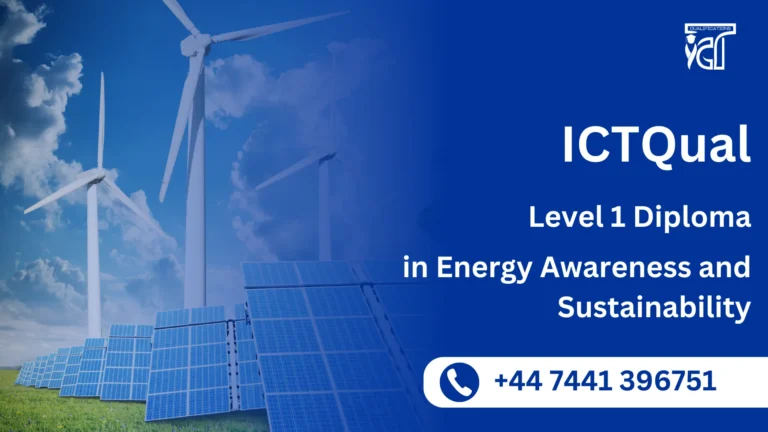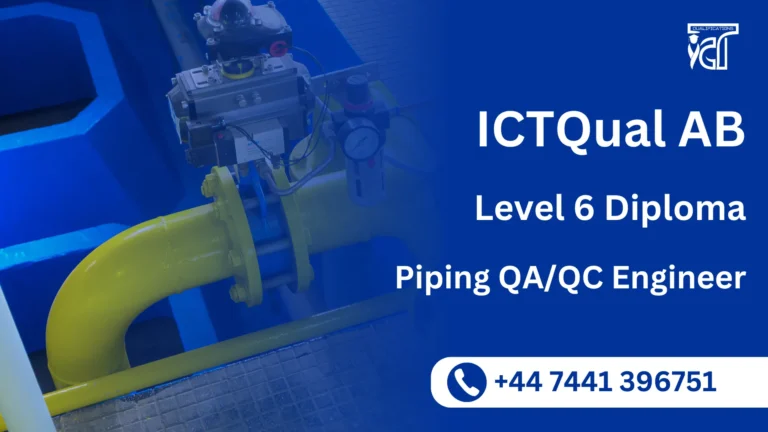The ICTQual AB Level 2 Diploma in Quality Control (QC) Piping is designed as a beginner‑friendly qualification for learners who are taking their very first steps into the world of piping inspection and quality assurance. This program provides a simple yet structured introduction to piping systems, fabrication basics, and compliance practices, making it accessible to those with little or no prior technical knowledge.
Learners are introduced to the fundamentals of piping materials, basic fabrication processes, and the importance of safety and compliance in industrial environments. The course emphasizes awareness rather than advanced technical detail, helping participants understand the role of quality control in ensuring reliable and safe piping operations.
By focusing on practical understanding, the diploma builds confidence and prepares learners to support inspection teams, recognize common issues, and contribute to documentation and reporting activities. It also highlights the importance of international standards such as ASME, API, and ISO, giving learners early exposure to globally recognized practices.
Ultimately, the ICTQual AB Level 2 Diploma in Quality Control (QC) Piping serves as the ideal entry point for beginners. It lays the groundwork for progression to higher‑level diplomas, specialized certifications, and future career opportunities in industries such as oil, gas, petrochemicals, construction, and manufacturing.
ICTQual AB Level 2 Diploma in Quality Control (QC) Piping
This qualification, the ICTQual AB Level 2 Diploma in Quality Control (QC) Piping, consists of 5 mandatory units.
| Sr# | Unit Title |
| 1 | Piping Fabrication and Installation Techniques |
| 2 | Visual Inspection and Common Defects |
| 3 | Dimensional Inspection Procedures |
| 4 | Introduction to Welding Processes in Piping |
| 5 | Piping Codes and Standards |
Learning Outcomes for the Study Units:
1. Piping Fabrication and Installation Techniques
By the end of this unit, learners will be able to:
- Understand the processes involved in piping fabrication and field installation.
- Identify key stages in pipe cutting, beveling, fitting, and welding.
- Monitor compliance with fabrication drawings, specifications, and work procedures.
2. Visual Inspection and Common Defects
By the end of this unit, learners will be able to:
- Conduct detailed visual inspections of piping systems, welds, and joints.
- Identify and classify surface defects such as cracks, undercuts, porosity, and misalignments.
- Record inspection findings using appropriate documentation and quality reports.
3. Dimensional Inspection Procedures
By the end of this unit, learners will be able to:
- Apply standard measurement techniques to verify pipe alignment, elevation, and spacing.
- Use dimensional inspection tools such as callipers, gauges, and measuring tapes accurately.
- Ensure dimensional conformity according to piping drawings and tolerance limits.
4. Introduction to Welding Processes in Piping
By the end of this unit, learners will be able to:
- Understand the fundamentals of common welding processes used in piping systems (e.g. SMAW, GTAW, GMAW).
- Recognise welding symbols and interpret basic weld procedure specifications (WPS).
- Relate welding parameters to quality requirements in piping applications.
5. Piping Codes and Standards
By the end of this unit, learners will be able to:
- Identify internationally recognised piping codes and standards such as ASME B31.3, API, and ISO.
- Understand the role of codes and standards in ensuring safety, quality, and compliance.
- Apply relevant code requirements to inspection, fabrication, and testing processes.
The ICTQual AB Level 2 Diploma in Quality Control (QC) Piping is designed as a beginner‑friendly qualification, offering learners their first exposure to piping systems, inspection practices, and compliance requirements. It builds confidence and prepares participants for progression into higher‑level diplomas and industry roles.
Technical Competence
- Basic awareness of piping materials and fabrication processes
- Introduction to welding procedures and inspection concepts
- Early exposure to international standards such as ASME, API, and ISO
- Understanding of safety and compliance principles in piping projects
- Ability to support documentation and reporting tasks in QA/QC teams
Professional Growth
- Entry into QA/QC support roles at trainee or assistant level
- Recognition through an internationally benchmarked qualification
- Foundation for progression to Level 3 and higher diplomas in QC Piping
- Improved employability in industries such as oil, gas, petrochemicals, and construction
- Opportunity to begin building a career pathway in piping inspection and quality assurance
Industry Relevance
- Alignment with industry practices in piping and fabrication projects
- Contribution to safe and reliable operations in industrial environments
- Exposure to practical scenarios and case studies for applied learning
- Ability to assist in audits, inspections, and compliance activities
Personal Development
- Confidence to start a career in piping QA/QC
- Curiosity and motivation to learn technical subjects
- Commitment to safety, compliance, and ethical responsibility
- Adaptability to diverse industrial environments
The ICTQual AB Level 2 Diploma in Quality Control (QC) Piping is designed for absolute beginners who are taking their first step into the world of piping inspection and QA/QC. The ideal learner is someone motivated to gain basic awareness of piping systems, safety practices, and compliance requirements, with no prior technical background needed.
Technical Background
- Beginners with little or no prior industry experience
- School leavers or early‑career participants seeking entry into piping QA/QC
- Learners with a basic interest in science subjects such as physics or materials
- Individuals curious about piping systems and fabrication processes
- Candidates eager to understand the role of quality control in industrial projects
Career Aspirations
- Learners aiming to enter QA/QC support roles at trainee or assistant level
- Individuals seeking recognition through an internationally benchmarked qualification
- Candidates preparing for progression to the ICTQual AB Level 3 Diploma in QC Piping
- Participants motivated to build a career pathway in piping inspection and quality assurance
- Early‑career learners seeking employability in oil, gas, petrochemical, and construction sectors
Personal Qualities
- Curiosity and willingness to learn technical subjects
- Commitment to safety and compliance practices
- Attention to detail in inspection and documentation tasks
- Adaptability to diverse industrial environments
Completing the ICTQual AB Level 2 Diploma in Quality Control (QC) Piping provides learners with the essential first step into piping inspection and QA/QC. This qualification builds awareness of piping systems, fabrication basics, and compliance practices, opening pathways to higher‑level diplomas, specialized certifications, and entry‑level industry roles.
Academic Progression
- Progression to ICTQual AB Level 3 Diploma in Quality Control (QC) Piping)
- Eligibility for advanced diplomas in QA/QC, welding inspection, or piping engineering after further study
- Opportunity to pursue specialized certifications such as ASME, API, ISO, and NDT Level II
- Preparation for structured learning routes in project quality management and industrial safety
- Foundation for higher‑level studies in inspection and quality assurance disciplines
Career Progression
- Entry into trainee QA/QC support roles in piping, welding, and fabrication projects
- Opportunities to work as assistants or junior inspectors in oil, gas, and petrochemical sectors
- Employability in construction, manufacturing, and power generation industries
- Foundation for supervisory responsibilities after progression to higher diplomas and gaining industry experience
- Increased career mobility through an internationally benchmarked qualification
Professional Development
- Recognition as a qualified learner with industry‑relevant skills
- Ability to support audits, inspections, and compliance activities
- Development of technical confidence for real‑world industrial projects
- Access to continuous professional development programs and industry workshops
Entry Requirements
Learners must meet the following criteria to be considered for admission into the course:
- Age Requirement: Minimum age of 18 years or above
- Educational Background: Completion of basic secondary school education or equivalent. No prior technical qualifications are required, making the course accessible to beginners
- Work Experience: No industry experience is required. The program is suitable for school leavers, early‑career participants, or individuals starting their journey in piping inspection and QA/QC
- English Language Proficiency: Basic ability in spoken and written English is required, as the program is delivered in English. International learners may be asked to demonstrate proficiency at CEFR A2 level or equivalent
Register Now
Qualification Process
Qualification Process for the ICTQual AB Level 2 Diploma in Quality Control (QC) Piping
- Self-Assessment:
Begin by evaluating your eligibility to ensure you meet the qualification requirements, including work experience, knowledge, and language proficiency. - Registration:
Complete your registration by submitting the required documents, including a scanned copy of a valid ID, and paying the registration fee. - Induction:
An assessor will conduct an induction to confirm your eligibility for the course and explain the evidence requirements. If you do not meet the criteria, your registration will be cancelled, and the fee will be refunded. - Assignments & Evidence Submission:
Provide all assignments and the necessary evidence based on the assessment criteria outlined in the course. If you are unsure of the required evidence, consult with the assessor for guidance on the type and nature of evidence needed. - Feedback and Revision:
The assessor will review your submitted evidence and provide feedback. Evidence that meets the criteria will be marked as “Criteria Met,” while any gaps will be identified. You will be asked to revise and resubmit if needed. - Competence Evidence:
Submit final evidence demonstrating that all learning outcomes have been met. This evidence will be marked as “Criteria Met” by the assessor once it is satisfactory. - Internal Quality Assurance (IQA):
The Internal Quality Assurance Verifier (IQA) will review your evidence to ensure consistency, quality, and compliance with standards. - External Verification:
The IQA will submit your portfolio to ICTQUAL AB External Quality Assurance Verifiers (EQA) for final confirmation. The EQA may contact you directly to verify the authenticity of your evidence. - Certification:
Upon successful completion of all checks, ICTQUAL AB will issue your official certificate, confirming that you have attained the ICTQual AB Level 2 Diploma in Quality Control (QC) Piping







